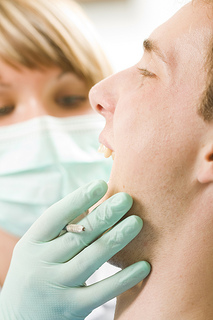March 4th, 2014

Capturing the Moment
At Northwest Smile Design we know that just about anyone who has taken on the challenge of planning her own wedding could tell you how important the little details can be. Things like having complementary colors, the right location, show-stopping flowers, and delicious food are all a big part of planning your spring wedding. Another little detail that has a big "I do" related role? Your smile.
Whether you’re the bride, or an attendant, looking your best when you tie the knot (or help someone tie the knot) is essential. If your teeth aren’t ready to make an entrance, turning to one of the many available teeth whitening solutions is a great option.
Reliable Solutions
Before the wedding day arrives, you should take your smile into consideration. If diet and daily wear-and-tear have caused your teeth to lose their original luster, our team can help! In-office procedures do cost more than kits you use at home, but with an in-office treatment, you benefit from a professional taking proper care of your teeth.
In addition, relying on our office to handle teeth whitening before the wedding can give you access to trustworthy advice on how to keep your teeth looking their best for a longer period of time. It’s common for someone experienced in assisting people with their oral health to suggest investing in an in-office whitening technique and then following up with a teeth-whitening kit at home.
This is a season of new beginnings and beauty. Take the time to bring out your most beautiful smile before the big day. Don’t let your smile hold you back on your wedding. With our in-office teeth whitening, you can be sure that you’ll be more confident and comfortable interacting with friends and family. So remember, when in need of some quality oral care in Marysville, WA to think of Dr. Kelly Peterson !
February 25th, 2014

CEREC is an acronym for Chairside Economical Restoration of Esthetic Ceramics. It is a type of dental technology that incorporates two computer technologies: CAD (computer-aided design), and CAM (computer-aided manufacturing). CEREC technology allows Dr. Kelly Peterson to design, make, and perfect a crown while you wait in the office. The process is generally completed in less than an hour.
The process begins when we take a picture of the tooth that will receive the crown. Using that picture, a digital impression of the real tooth is created. The proprietary software allows us to create the adjacent teeth digitally, which aids in the process of recreating the computer image that is sent to the milling machine via wireless transmission.
If we recommend a CEREC crown, you will get a permanent crown during a single office visit. We will be able to take a picture of your tooth and mouth, and then create the crown for your tooth. The design process allows us to match your crown to your real tooth as closely as possible.
CEREC crowns are made out of either ceramic material or a type of synthetic resin. Blocks of the material Dr. Kelly Peterson will choose go into the milling machine, where diamond blades file and shape the block of solid material into a crown that will look as much like your real tooth as possible.
Before permanently securing the crown in your mouth with resin cement, we will smooth, file, and refine the shape of the crown, putting it in your mouth to check your bite, and removing it to make small adjustments. After cementing the tooth in your mouth, Dr. Kelly Peterson will check to make sure the surface of the crown is smooth enough to make proper contact with your teeth when you bite down.
For more information about CEREC, or to schedule an appointment with Dr. Kelly Peterson, please give us a call at our convenient Marysville, WA office!
February 19th, 2014

Last month, Dr. Peterson turned the big 5-0! Rather than have a typical office birthday, we did something really special!

We pretended the day would be a normal day of patients and filled the calendar up with fake patient names, like Noah and Allie Calhoun. We decorated the office and had matching shirts made for the occasion that said, "I'm with the old guy" and for Dr. Peterson, "I am the old guy"!

We surprised Dr. Peterson with a trip to I Fly for some indoor skydiving and afterwards we got lunch at The Cheesecake Factory!
It was a great day and we hope he enjoyed his birthday!

February 18th, 2014

Oral cancer is largely viewed as a disease that affects those over the age of 40, but it can affect all ages, even non-tobacco and alcohol users. Oral cancer can occur on the lips, gums, tongue, inside lining of the cheeks, roof of the mouth, and the floor of the mouth. Our team at Northwest Smile Design recently put together some facts and figures to illustrate the importance of visiting our Marysville, WA office.
Our friends at the American Cancer Society recommend an oral cancer screening exam every three years for people over the age of 20 and annually for those over age 40. Because early detection can improve the chance of successful treatment, be sure to ask Dr. Kelly Peterson and our team to conduct an oral exam during your next visit to our Marysville, WA office.
- Symptoms of oral cancer may include a sore in the throat or mouth that bleeds easily and does not heal, a red or white patch that persists, a lump or thickening, ear pain, a neck mass, or coughing up blood. Difficulties in chewing, swallowing, or moving the tongue or jaws are often late symptoms.
- The primary risk factors for oral cancer in American men and women are tobacco (including smokeless tobacco) and alcohol use. Risk rises dramatically (30%) for people who both smoke and consume alcohol regularly.
- Oral cancers are part of a group of cancers commonly referred to as head and neck cancers, and of all head and neck cancers they comprise about 85% of that category.
- Oral cancer is the sixth most common cancer among men.
- Oral cancer is more likely to affect people over 40 years of age, though an increasing number of young people are developing the condition.
- Death rates have been decreasing over the past three decades; from 2004 to 2008, rates decreased by 1.2% per year in men and by 2.2% per year in women, according to the American Cancer Society.
- About 75% to 80% of people with oral cavity and pharynx cancer consume alcohol.
- The risk of developing oral cavity and pharynx cancers increases both with the amount as well as the length of time tobacco and alcohol products are used.
- For all stages combined, about 84% of people with oral cancer survive one year after diagnosis. The five- and ten-year relative survival rates are 61% and 50%, respectively.
- It is estimated that approximately $3.2 billion is spent in the United States annually on treatment of head and neck cancers.
Cancer can affect any part of the oral cavity, including the lip, tongue, mouth, and throat. Through visual inspection, Dr. Kelly Peterson and our team at Northwest Smile Design can often detect premalignant abnormalities and cancer at an early stage, when treatment is both less extensive and more successful.
Please let us now if you have any questions about your oral health either during your next scheduled appointment, by giving us a call or asking us on Facebook.













 Website Powered by Sesame 24-7™
Website Powered by Sesame 24-7™